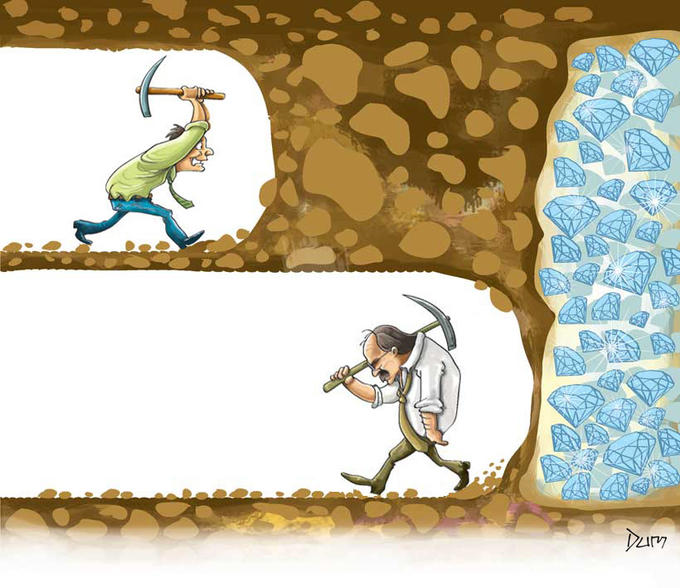For Men’s Eyes Only

When writing about the importance of reciting the Shema morning and evening, we often focus on the first verse that declares the oneness of G‑d, i.e. Hashem echad. However, in this article we’re going to focus on a verse in the third paragraph (Bamidbar 15:39): וְהָיָה לָכֶם לְצִיצִת וּרְאִיתֶם אֹתוֹ וּזְכַרְתֶּם אֶת־כׇּל־מִצְוֺת יְיָ וַעֲשִׂיתֶם אֹתָם וְלֹא־תָתוּרוּ אַחֲרֵי לְבַבְכֶם וְאַחֲרֵי עֵינֵיכֶם אֲשֶׁר־אַתֶּם זֹנִים אַחֲרֵיהֶם (And it shall be for a tzitzit for you, and you shall look at it and remember all the mitzvot of Hashem and do them; and you shall not ‘tour around’ after your heart or after your eyes which you use to commit sexual immorality). We have translated this verse rather literally in order to make plain what most English translations delicately avoid. Hashem is giving His people quite a pointed rebuke, yet do we feel any shame when we read this?
But, you may ask, is this verse supposed to be taken so literally? The Rambam, referencing the passage in the Gemara that discusses this verse (see Berachot 12b), writes the following in Mishneh Torah (Hilchot Avodah Zarah v’Chukot ha-Goyim 2:3): אַחֲרֵי לְבַבְכֶם זוֹ מִינוּת וְאַחֲרֵי עֵינֵיכֶם זוֹ זְנוּת (‘After your heart’ refers to heresy and ‘after your eyes’ refers to sexual immorality). We read essentially the same thing in Shnei Luchot ha-Brit (Torah Sh’bikhtav, Shelach, Ner Mitzvah 4): ולא תתורו אחרי לבבכם זה מינות ואחרי עיניכם זה הזנות (‘And you shall not tour around after your heart’ refers to heresy, and ‘after your eyes’ refers to sexual immorality). It was the transgression of this prohibition that led to the downfall of Shimshon ha-Gibbor. When justifying his desire to marry a Philistine woman, he said to his father (Shofetim 14:3): אוֹתָהּ קַח־לִי כִּי־הִיא יָשְׁרָה בְעֵינָי (Take her for me, for she is upright in my eyes). And for his transgression, he was judged in classic middah k’neged middah fashion (Sotah 9b): תָּנוּ רַבָּנַן שִׁמְשׁוֹן בְּעֵינָיו מָרַד…לְפִיכָךְ נִקְּרוּ פְּלִשְׁתִּים אֶת עֵינָיו שֶׁנֶּאֱמַר וַיֹּאחֲזוּהוּ פְלִשְׁתִּים וַיְנַקְּרוּ אֶת עֵינָיו (The Rabbis taught, Shimshon rebelled with his eyes…Therefore, the Philistines gouged out his eyes, as it is written [Shofetim 16:21], ‘And the Philistines seized him and gouged out his eyes’). Admittedly, this may seem harsh based on today’s standards, but that’s not the point. We’re not here to judge Hashem. The point is for us to evaluate ourselves, and if we could just grasp even a little bit of the severity of this prohibition we would be doing well.
As we all know, there is ‘seeing’ and then there is ‘seeing’. So what kind of ‘seeing’ does our verse prohibit? We will let the reader look up the full extent of the halachot in the Shulchan Aruch, but we will bring down at least a few highlights here (Even Ha-Ezer 21): צריך אדם להתרחק מהנשים מאד מאד…ואסור…להביט ביופיה ואפילו להריח בבשמים שעליה אסור…פגע אשה בשוק אסור להלך אחריה אלא רץ ומסלקה לצדדין או לאחריו…והמסתכל אפילו באצבע קטנה של אשה ונתכוין ליהנות ממנה כאלו נסתכל בבית התורף [פי’ ערוה] שלה…ואסור…לראות שערה (A man needs to stay really, really far away from women…and it is forbidden…to gaze at her beauty, and even to smell her perfume is forbidden…if a man met a woman in the market, it is forbidden to walk behind her, rather he must run so that she is either to his side or behind him…and to gaze even at the little finger of a woman with the intent to derive pleasure from it is as if he was gazing at her genitals…and it is forbidden…to gaze at her hair). The Mishnah Berurah also writes (Orach Chaim 75:7): אבל לענין איסור הסתכלות לכו”ע המסתכל באשה אפילו באצבע קטנה כיון שמסתכל בה להנות עובר בלאו דלא תתורו אחרי עיניכם ואמרו שאפילו יש בידו תורה ומע”ט לא ינקה מדינה של גיהנם (But about the prohibition against gazing, the opinion of all poskim is that the one who gazes at even the little finger of a woman, since he is gazing at it to derive pleasure, he transgresses the negative prohibition of ‘you shall not tour around after your eyes’ [Bamidbar 15:39], and they say that even if he has a lot of Torah and good deeds to his credit, he won’t be exempt from the judgment of Gehinnom). He continues to explain that incidental seeing is not prohibited per se; however, an ‘important individual’ should be careful under all circumstances, whether incidental or deliberate. We’ll quote one final teaching from our Sages to highlight the seriousness of this prohibition (Berachot 61a): אָמַר רַבִּי יוֹחָנָן אֲחוֹרֵי אֲרִי וְלֹא אֲחוֹרֵי אִשָּׁה (R’ Yochanan said, ‘[A man should walk] behind a lion and not behind a woman’).
Why is gazing such a serious a matter? Rashi comments on our verse from Bamidbar 15:39: הַלֵּב וְהָעֵינַיִם הֵם מְרַגְּלִים לַגּוּף מְסַרְסְרִים לוֹ אֶת הָעֲבֵרוֹת הָעַיִן רוֹאָה וְהַלֵּב חוֹמֵד וְהַגּוּף עוֹשֶׂה אֶת הָעֲבֵרָה (The heart and the eyes are ‘spies’ for the body, pimping for it sins: the eye sees, the heart covets, and the body does the sin). And even if the rest of the body doesn’t follow through with any further action, we as B’nei Yisrael are held to a high standard and are judged as having committed sexual immorality. This is similar to the manner in which the Torah describes Reuven’s sin even though ‘all he did’ was to rearrange his father’s bed (see Bereshit 35:22 and Shabbat 55b).
Interestingly, these three steps are essentially the same three steps Chavah followed when she ate from the forbidden fruit (Bereshit 3:6): וַתֵּרֶא הָאִשָּׁה כִּי טוֹב הָעֵץ לְמַאֲכָל וְכִי תַאֲוָה־הוּא לָעֵינַיִם וְנֶחְמָד הָעֵץ לְהַשְׂכִּיל וַתִּקַּח מִפִּרְיוֹ וַתֹּאכַל (And the woman saw that the tree was good for food, and a lust for the eyes, and that the tree was pleasant to make one wise, and she took from its fruit and ate). Although this verse is describing a reality in the higher world of Yetzirah where the words ‘seeing’ and ‘eating’ are not describing physical actions, the words are still valid for our fallen world of Asiyah: ‘seeing’ leads to lusting, and lusting leads to ‘eating’, which is the actualized sin. Since ‘seeing’ lies at the root of sin from the very beginning of the history of man, prudency would dictate that we ought to guard our eyes against seeing what they should not see.
How can we rectify this sin of seeing in order to derive pleasure? There are two main methods depending on the depth of one’s transgressions. At the very least, one needs to close one’s eyes when reciting the Shema and concentrate deeply on unifying Hashem’s names: Adon-i [א‑ד‑נ‑י], the name associated with the Shechinah and the sefirah of Malchut, and Havayah [י‑ה‑ו‑ה], the name associated with the six sefirot of Ze’ir Anpin. R’ Nachman teaches in Likutei Moharan 36:3: לְפִיכָךְ כְּשֶׁקּוֹרִין פָּסוּק רִאשׁוֹן שֶׁל קְרִיאַת־שְׁמַע צָרִיךְ לְהַעֲצִים אֶת עֵינָיו בִּבְחִינַת “עוּלִימְתָּא שַׁפִּירְתָּא דְּלֵית לָהּ עֵינִין” כִּי תִּקּוּן שֶׁל הִרְהוּרֵי זְנוּת שֶׁבָּא לָאָדָם שֶׁיֹּאמַר שְׁמַע וּבָרוּךְ שֵׁם (Therefore, when we read the first verse of the Shema, it is necessary to close one’s eyes in the aspect of ‘a beautiful maiden who has no eyes’, because the tikkun for thoughts of sexual immorality that come upon a man is to recite Shema etc. and Baruch Shem etc.). The deeper one concentrates while accepting upon himself the yoke of the kingship of G‑d, the more he disconnects himself from the klipah of the Sitra Achra, i.e. from the zivug of the Samech-Mem, and to attach himself to G‑d in the splendor of kedushah, as it is written (Tehillim 29:2): הָבוּ לַיְיָ כְּבוֹד שְׁמוֹ הִשְׁתַּחֲווּ לַיְיָ בְּהַדְרַת־קֹדֶשׁ (Give to Hashem the honor due His name, bow to Hashem in the splendor of holiness). This is the meaning of the ‘beautiful maiden who has no eyes’. The beautiful maiden is the Shechinah or Knesset Yisrael, the zivug of the Holy One of Yisrael, blessed be He. Having ‘no eyes’ means that she is not driven at all by the lusts that come via the eyes.
However, if someone routinely transgresses in this area, this level of rectification will not be sufficient to pull him out from the impurity into which he has fallen. Rather, he will need more potent medicine. And what is that medicine? The healing property of one’s own heartfelt tears of remorse and shame (L.M. 36:4): אֲבָל אִם הוּא חַס וְשָׁלוֹם רָגִיל בְּהִרְהוּר שֶׁל הַתַּאֲוָה הַכְּלָלִיּוּת רַחֲמָנָא לִצְלָן וְאֵינוֹ יָכוֹל לְהַפְרִיד מִמֶּנָּה אֲזַי צָרִיךְ גַּם כֵּן לְהוֹרִיד דְּמָעוֹת בִּשְׁעַת קַבָּלַת מַלְכוּת שָׁמַיִם (However, if he, G‑d forbid, regularly has thoughts relating to this all-encompassing lust, Rachmana litzan, and he can’t separate himself from it, then he needs to shed tears at the time that he is accepting the kingship of Heaven). Considering how difficult it is to shed tears these days, we might want to make the extra effort to break this lust once and for all.
And this is the deep secret found in the Torah’s description of what was happening among the faithful Jews during the time when Zimri was engaging in adultery with Kozbi (Bamidbar 25:6): וְהִנֵּה אִישׁ מִבְּנֵי יִשְׂרָאֵל בָּא וַיַּקְרֵב אֶל־אֶחָיו אֶת־הַמִּדְיָנִית לְעֵינֵי מֹשֶׁה וּלְעֵינֵי כׇּל־עֲדַת בְּנֵי־יִשְׂרָאֵל וְהֵמָּה בֹכִים פֶּתַח אֹהֶל מוֹעֵד (And behold, a man [Zimri ben Salu] from B’nei Yisrael came and brought to his brothers a Midianite woman [Kozbi bat Tzur] in the presence of Moshe and in the presence of the whole congregation of B’nei Yisrael, and they were crying at the entrance to the Tent of Meeting). What is the meaning of this crying? Targum Yonatan tells us: וְאִינוּן בַּכְיַין וְקַרְיַין שְׁמַע (They cried and recited the Shema). It is as R’ Nachman explains (L.M. 36:4): וְזֶה לֹא עָשׂוּ אֶלָּא כְּדֵי לְהִנָּצֵל מֵהִרְהוּר שֶׁל אִשָּׁה זוֹנָה שֶׁהִיא קְלִפָּה הַקּוֹדֶמֶת לַפְּרִי וְלָבוֹא לְהִתְגַּלּוּת הַתּוֹרָה (They cried to be saved from [lustful] thoughts instigated by the adulterous woman [i.e. the zivug of the Samech-Mem] who is the peel [klipah] that precedes the fruit, in order to come to the revelation of Torah).
If you missed it, read that again. The greater the test, the greater the reward when we pass it. It is not impossible; G‑d doesn’t command the impossible. True, it may be difficult, especially in our generation where forbidden sights assault us from all directions, but it is not impossible. After all, do we not believe the words of our Sages? They taught (Shabbat 104a): בָּא לִיטָּהֵר מְסַיְּיעִים אוֹתוֹ (One who comes to become purified, they [Heaven] assist him).
Three times a day we pray וְתֶחֱזֶינָה עֵינֵינוּ בְּשׁוּבְךָ לְצִיּוֹן בְּרַחֲמִים (And may our eyes see Your return to Tzion in mercy). Do we think that the same eyes that gaze at that which is forbidden are going to merit seeing Hashem’s return? Can the impure have a share in the pure? Rather, we should work on fulfilling what David ha-Melech trained himself to do (Tehillim 16:8): שִׁוִּיתִי יְיָ לְנֶגְדִּי תָמִיד (I constantly place י‑ה‑ו‑ה before me). Eyes that picture the name of Hashem throughout the day just might be eyes that merit seeing His return.
In conclusion, the complete revelation of Mashiach ben David is near, and we are at the cusp of receiving new revelations of Torah, even beyond that which Moshe brought down from Mt. Sinai with the first set of tablets. Avert your gaze, men. There is an old adage: curiosity killed the cat. It has the power to kill us too if we don’t break the spirit of curiosity that constantly incites our eyes to ‘tour around’. Instead, let’s gaze into a Gemara. There’s plenty there about which to be curious.






